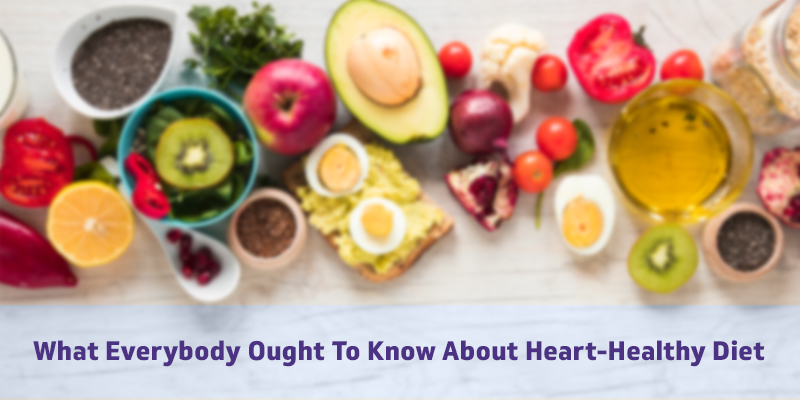
Heart-Healthy Diet:
According to clinical research, healthy lifestyle habits along with Heart-Healthy diet may reduce the risk of heart disease or stroke by 80%. Cardiovascular disease (CVD) includes a wide range of conditions that can affect your heart. Coronary Artery Disease develops when the blood vessels that supply your heart with blood, oxygen and nutrients become damaged or diseased. This is caused by cholesterol-containing deposits (plaque) which narrows down the coronary arteries, decreasing the blood flow to your heart. Eventually, the insufficient blood flow may cause chest pain (Angina), shortness of breath and other symptoms. Smoking, diabetes or insulin resistance, high blood pressure, high cholesterol and sedentary lifestyle are some of the key causes of CVD.
Although weight management and regular exercise are critical for keeping your heart healthy, the food you eat plays an equally important role.
There is no single food that can make you magically healthy, so your overall dietary pattern is critical. Here are some important tips for Healthy-Heart Diet:
Tips for a Healthy-Heart Diet:
- Portion control is the key to any diet. Eat in smaller plate or bowl to control your portion size.
- Increase the intake of fruits and vegetables. They are undoubtedly healthful foods and boost the immune system, providing nutrients your body needs to fight diseases. They are low in calories and rich in nutrients and fibre.
- Choose whole grains over refined grains. Get whole-grain flour, Millets, Jowar, Bajra, whole wheat bread, brown rice etc. They help in regulating blood sugar and blood pressure.
- Soluble fibre can help lower the cholesterol level and control blood sugar levels. Try to aim for about 10 to 25 grams of soluble fibre per day. It is found in oats, nuts, seeds, beans, lentils and some fruits and vegetables.
- Avoid unhealthy fats. Foods high in saturated fat can increase your blood cholesterol level, which needs to be avoided for a better heart health. You should avoid trans fats and saturated fats and foods high in salt and sugar.
- Choose protein sources with less fat like lean meat, poultry and fish, fat-free dairy products and eggs are some of the best options. Beans, peas and lentils are also good sources of protein and contain less fat and no cholesterol, making them excellent choices for vegetarians.
- It is a good idea to incorporate lean protein, fibre and omega-3s into your morning meal.
- Reduce salt or sodium in food. Excess sodium can worsen your high blood pressure, which is a risk factor for heart disease.
- Plan in advance and create daily menus. This will prevent you from eating unhealthy food.
- Make smart substitutions like low-fat or fat-free cheese and milk, cook with liquid vegetable oils (olive, mustard, sunflower, canola) instead of solid fats such as butter, lard or shortening.
- At snack time, skip the biscuits, chips, cookies, namkeen etc. and instead opt for low-salt options with plenty of fibre and protein like roasted seeds, nuts, chana to tide over until the next meal.
Tips for lifestyle management:
- Maintain a healthy weight
- Quit smoking
- Meet your doctor regularly to manage other health conditions, such as high blood pressure, high cholesterol and diabetes
- Aim to exercise at least 30 minutes a day on most days of the week
- Reduce and manage stress
- Practice good hygiene
Compiled By,
Dr Manjari Bansal– Content Writer, RxDx
Inputs given by,
Vidya Narasimhan – Senior Nutritionist, RxDx
For further details, please contact: 080-49261111, 6745-8111

